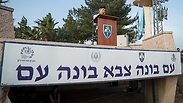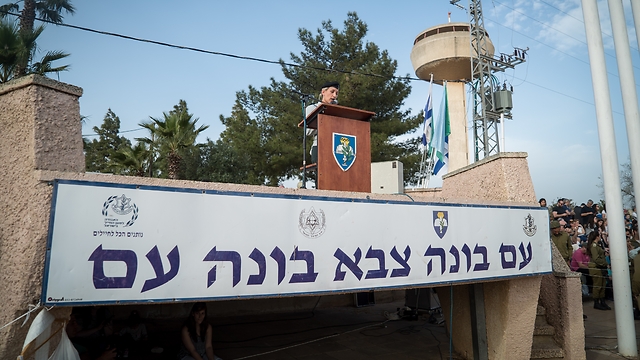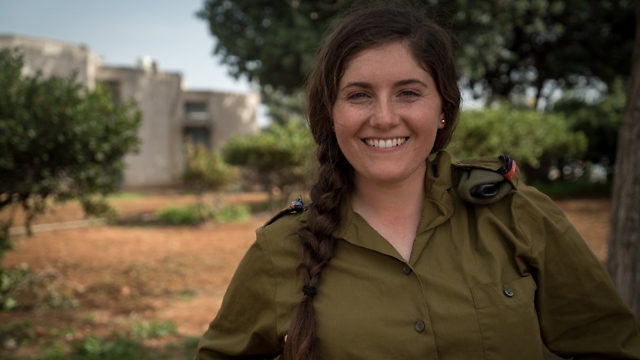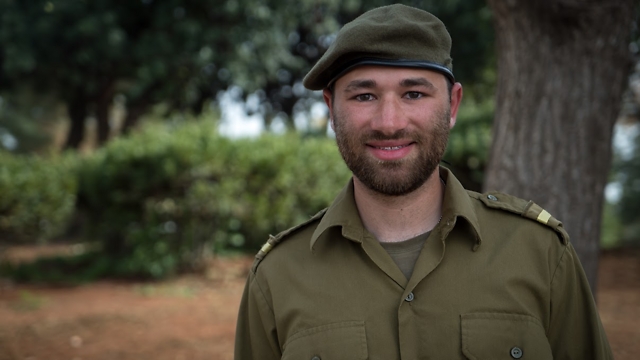
The warrior academics
Jews from all over the world move to Israel and enlist in the IDF every year as lone soldiers, and many join after getting a college degree. For various reasons, they decide to leave the civilian world behind in order to serve in something much bigger than themselves.
The base, Mikhve Alon, is under the command of the Education and Youth Corps, and is perhaps best known for its Hebrew program. New soldiers go to this base if their initial Hebrew level is too low. The course provided is a three-month program combining intense Hebrew, Zionism, and Israeli history lessons alongside basic training.
Of these soldiers, 350 were “lone soldiers,” meaning they don't live with their parents. Many of these soldiers move to Israel alone with the purpose of joining the IDF. Some are from Africa, the former Soviet bloc, or Latin American countries, and come to Israel to seek better lives and opportunities than they could in their countries of origin. Some come from other areas of Europe where anti-Semitism is once again rearing its head. Others are from North America or Australia, looking to serve before heading off to college.
Yet, there is a small but significant number of people whose circumstances are different. They come from Western countries with relatively little anti-Semitism and strong economies - at an older age and with academic degrees. They have the keys to the world in their hands. Still, they decide to leave the West and their professional life behind in order to enlist in the IDF.
One of the people who chose this path less travelled, and finished her basic training at Mikhve Alon last week, is Rochelle Windman, 22 - with a degree in communications from Indiana University – who will be an IDF combat engineer instructor, teaching soldiers how to handle explosives.
Rochelle knew she wanted to enlist while she was in high school. “My parents told me that if it was truly important to me I would wait until after college. Even though they thought the four years would change my mind, I stuck to my plan: one month after graduating I got on the plane and began this abnormal post-grad life."
Although the salary in the IDF may not be comparable to that of her friends, she still feels that her situation now is not much different than what her life would have looked like had she stayed in the US.
“I see that my friends, who are fresh out of college, are both thriving and struggling in their own way. So when I look back and think about where my friends are in new jobs and new cities, I don't feel like I'm so different: Just as I moved to a new place and started from scratch, they're all doing the same thing,” Rochelle observes.
Another soldier who recently finished basic training at Mikhve Alon is Lee Mash, 27 - with a degree in international business from the University of Texas at San Antonio - will soon begin training with the Nahal infantry battalion. Before he enlisted, he worked with his family’s investment firm, which invests primarily in medical startups.
Lee acknowledges that being almost a decade older than most of his fellow soldiers and commanders presents its own set of challenges.
“It's crazy to think that I moved out of my parents’ house and lived on my own before my commanders were even bar/bat mitzvahed,” he says. But he doesn’t let the age gap bother him. “I think of my commanders as my bosses and it’s my job to do what they tell me to do. They are the experts here, and I have full trust and confidence in them.”
By contrast, as Rochelle is closer in age to her colleagues, she doesn't feel any difference at all.
"My commanders have more responsibility than I could've ever handled in college," she comments. "To me, their age doesn't mean anything. I personally feel more ready for this experience after college, and really commend these young girls who go in at eighteen."
Many people find it hard to imagine why people with such backgrounds and in their mid-20’s would decide to up and leave the comforts of the US and launch their life in a completely different direction.
“I wanted to do something different,” Lee says. “I went on a Birthright trip and did a six-month Jewish Agency program and I felt a special connection to Israel. I believe in the State of Israel and I wanted to fight for what I believe in. I also wanted a new kind of challenge and I believed it was time to start a new journey.”
However, joining the IDF doesn’t come without sacrifice.
“I really miss my friends and family back home, and that's one of the most difficult parts of being a lone soldier," Lee says. "All of my friends are getting married, buying houses, nice cars, making lots of money, and I'm in Israel being paid by the army, which is not much. Meanwhile, my family is getting older and I'm watching my brothers grow up and start their careers from the sidelines. I haven't been home in over a year and I probably won't be home for another year. It's very difficult.”
Another soldier, 25, who obtained a degree from the University of Maastricht in the Netherlands - also in international business - experiences many of the same hardships. He currently serves in the intelligence unit of the paratroopers, and his name is withheld.
“It’s hard for me to see my friends in Europe moving on with their lives. I feel like my life has stopped, and that it isn’t progressing,” he says.
“At times when I feel like this, I stop and I think about the big picture,” he continues. “I think about the reasons why I joined the IDF. At the end of the day, I’m happy I joined the army, and I know that when I get released, I’ll be in the same position as them.”
The University of Maastricht School of Business and Economics is one of the best in Europe, and it counts some of Europe’s top business and economic leaders amongst its alumni. With the world of European business at his fingertips, he was still compelled to come to Israel and serve.
“After graduating in the summer of 2014, I decided to come to Israel and do an Ulpan (Hebrew school - ed.) at Tel Aviv University. While I was studying, Operation Protective Edge broke out. After that, I knew 100 percent that I needed to join the IDF, specifically to a combat role.”
As with Lee, he sometimes feels the age difference between himself and his commanders.
“This was the most difficult thing for me,” he admits. “In university, I was independent, while in the army, it's completely different. Someone else is in complete control of my life. It was really hard at first, but I had to accept it. I was 24 when I joined the army, and my Lieutenant was 22.”
How did you deal with this?
“I learned very quickly that in the army, especially in combat roles, everyone starts at zero - age really doesn’t matter. What matters in the end is how good of a soldier you are. Are you willing to help your friends and be part of the team - or do you only think about yourself?"
Aliza Green, 24, a tank crew and gunnery instructor, who graduated from Temple University with a degree in Middle East studies, shared similar sentiments.
“Age and life experience can be a factor, but at the end of the day, my commanders went through things and learned things which I didn’t. I completely trust and respect them, regardless of the age difference.”
“However,” she continues, “Sometimes, I feel really limited by the army routine, and this does affect me. But I knew that it would be like this coming in, so I was mentally prepared for it.”
Aliza didn’t grow up in a particularly Zionist family. She has no relatives in Israel and no family members served in the IDF. But after a college Birthright trip, something changed.
“I came here on a Birthright trip and I really connected with the country,” she said. “After that trip, I made every effort I could to come back. Whenever I returned to the US, I felt depressed, like I was missing or lost something. I decided that I never wanted to feel that way again.”
This feeling is what ultimately led her to move to Israel and join the army.

“I came here to live. Here I feel complete. I look at my friends in the States – they work all the time, and many of them don’t seem very happy or fulfilled in their lives. I feel extraordinarily fulfilled in my life, and I feel that my life has meaning as a soldier in the IDF.”
Lee agrees with Aliza - “Most of my friends go to high school, go to college, then work a corporate job after they graduate - and many hate their career. While it is difficult being alone in a foreign country, I'm so happy I made the decision to move here. I've grown so much as a person and learned a lot about myself. It's the best decision I've ever made.”
Lee also plans on staying in Israel long term.
“I feel that the best way to be successful in Israel is to join the army. The entire culture is based on the army - the conversations, the humor, the politics... When I finish the army I will have Israeli rapport, excellent Hebrew and I will have a much better understanding of Israeli culture, all of which will enable me to be successful in this country.”
“I came here to stay,” the paratrooper says. “I knew that I had to join the army in order to learn the Israeli mentality. In the army, I've met people from all sectors of Israeli society – Druze, ultra-Orthodox, seculars, rightists, leftists, centrists, etc. I feel it’s easier to understand what goes on here after being in the military, and it makes it easier for new immigrants to live here in general.”
“At the end of the day,” Rochelle added, “I love that my first job out of college is being a soldier in the IDF. Every morning I get to wake up and put on the uniform of an army that my Jewish ancestors could have only dreamed of.”
On the parade grounds of Mikhve Alon is a sign which reads “the nation builds the army, and the army builds the nation.” These men and women with academic degrees and professional skills came to Israel to serve the IDF, and will leave with skills necessary to succeed in and strengthen Israeli society.












